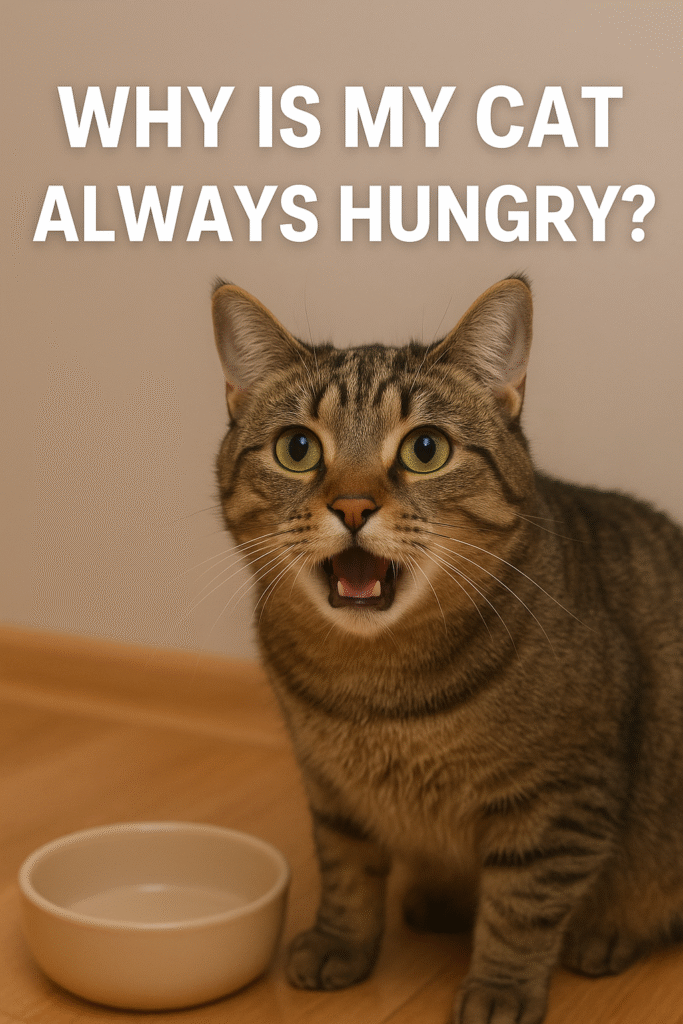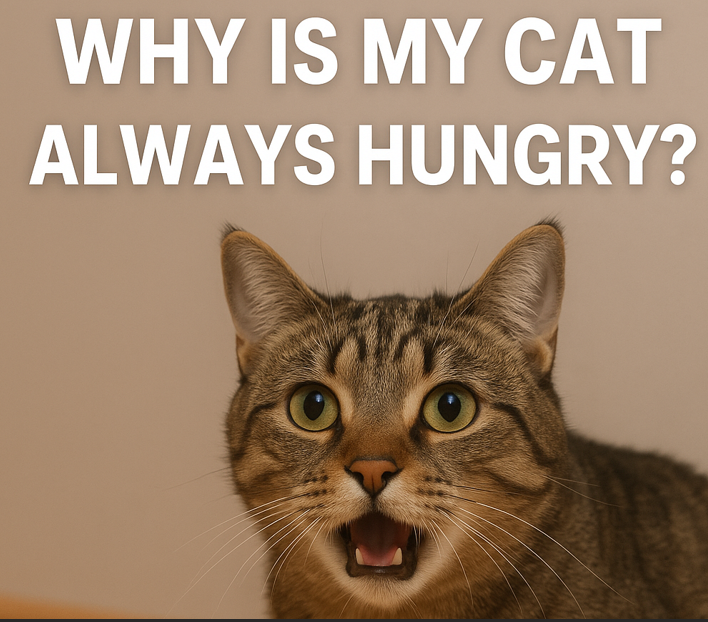Why Is My Cat Always Hungry? Causes, Concerns, and What to Do
If you’ve ever wondered, “Why is my cat always hungry?”, you’re not alone. Many cat owners notice their feline constantly meowing for food, begging at the dinner table, or acting like they haven’t eaten in days even when their bowl is full. While sometimes this is normal cat behaviour, persistent hunger can also signal health or behavioural issues.
Normal vs. Abnormal Hunger in Cats
Cats naturally enjoy eating multiple small meals throughout the day. In the wild, they would hunt several times daily. So, it’s normal for them to show interest in food often. However, if your cat seems obsessed with food, losing or gaining weight rapidly, or meowing excessively for meals, there may be an underlying cause.
Common Reasons Cats Always Seem Hungry
1. Not Enough Food or the Wrong Diet
- If your cat’s food is low in protein or poor quality, they may not feel satisfied.
- Free-feeding dry kibble often leads to over-eating without proper nutrition.
- Cats need a balanced, meat-based diet to stay full.
Tip: Check food labels. Look for a diet with high-quality animal protein and low fillers.
Boredom or Attention-Seeking
Sometimes, cats beg for food simply because it gets your attention. Meowing, pawing, or sitting by the bowl may be more about companionship than hunger.
What to do: Increase playtime, provide enrichment (puzzle feeders, cat trees), and ensure your cat isn’t using food as their only form of stimulation.
Parasites (Worms)
Intestinal parasites like roundworms can cause cats to feel constantly hungry, even as they lose weight. This is especially common in outdoor cats or kittens.
Signs:
- Big appetite but skinny body
- Vomiting or diarrhoea
- Dull coat
Solution: Regular deworming as recommended by your vet.
Diabetes Mellitus
Diabetes causes the body to struggle with converting food into energy. Cats with diabetes often eat more but still lose weight.
Symptoms:
- Constant hunger
- Weight loss despite eating
- Increased thirst and urination
Action: See your vet immediately. Diabetes is treatable but requires management.
Hyperthyroidism
This is common in senior cats. An overactive thyroid speeds up metabolism, causing cats to burn energy too quickly.
Signs:
- Ravenous appetite
- Weight loss
- Hyperactivity or restlessness
- Vomiting
Treatment: Medication, diet changes, or sometimes surgery.
Intestinal or Digestive Disorders
If your cat isn’t properly absorbing nutrients, they may stay hungry no matter how much they eat. Conditions like IBD (Inflammatory Bowel Disease) or pancreatic issues can be culprits.
Old Age and Cognitive Changes
Senior cats may meow for food more often due to confusion, dementia, or comfort-seeking rather than true hunger.
Solution: Stick to a routine, feed smaller meals more often, and discuss senior cat diets with your vet.
Overeating and Obesity Habits
If your cat is always hungry but overweight, it may be due to free-feeding, boredom, or habit. Just like people, cats can develop overeating behaviours.
Why Is My Cat Always Hungry but Skinny?
This often points to:
- Parasites
- Diabetes
- Hyperthyroidism
- Poor nutrient absorption
Skinny + hungry = vet check urgently.
Why Is My Cat Always Hungry and Meowing?
Excessive meowing while begging for food could be:
- Learned behaviour (they know it works!)
- Hunger due to medical issues
- Age-related cognitive decline
If the meowing is new and persistent, get a check-up.
Why Is My Female Cat Always Hungry?
For unspayed females, increased hunger could be linked to hormonal changes or pregnancy. Otherwise, the same causes (parasites, diet, illness) apply.
Why Is My Senior or Old Cat Always Hungry?
Older cats commonly experience:
- Hyperthyroidism
- Kidney disease (causing increased thirst and appetite)
- Cognitive dysfunction
Senior cats should have yearly vet exams, or more often if symptoms appear.
When to See a Vet
If your cat’s hunger is constant, extreme, or paired with weight loss, vomiting, diarrhoea, or increased thirst, don’t wait book a vet appointment. Early treatment can prevent serious illness.
How to Manage a Hungry Cat at Home
- Feed a high-protein, balanced diet (wet food helps).
- Schedule meals instead of free-feeding.
- Use puzzle feeders to slow eating and provide enrichment.
- Provide play and stimulation to reduce boredom-eating.
- Track weight and appetite changes to catch issues early.

FAQ
Q: Why does it seem like my cat is always hungry?
Cats are natural grazers, but if hunger is excessive, it may signal a health or behavioural issue.
Q: Why is my cat always hungry but fat?
Likely due to overeating, boredom, or a high-calorie diet. Switch to portion control and encourage exercise.
Q: Why is my old cat always hungry?
Senior cats may develop hyperthyroidism, diabetes, or kidney disease. Get a vet check-up.
Q: My cat is always hungry and begging for food—should I feed them more?
Not necessarily. First, rule out medical causes. Overfeeding can worsen obesity and health problems.

